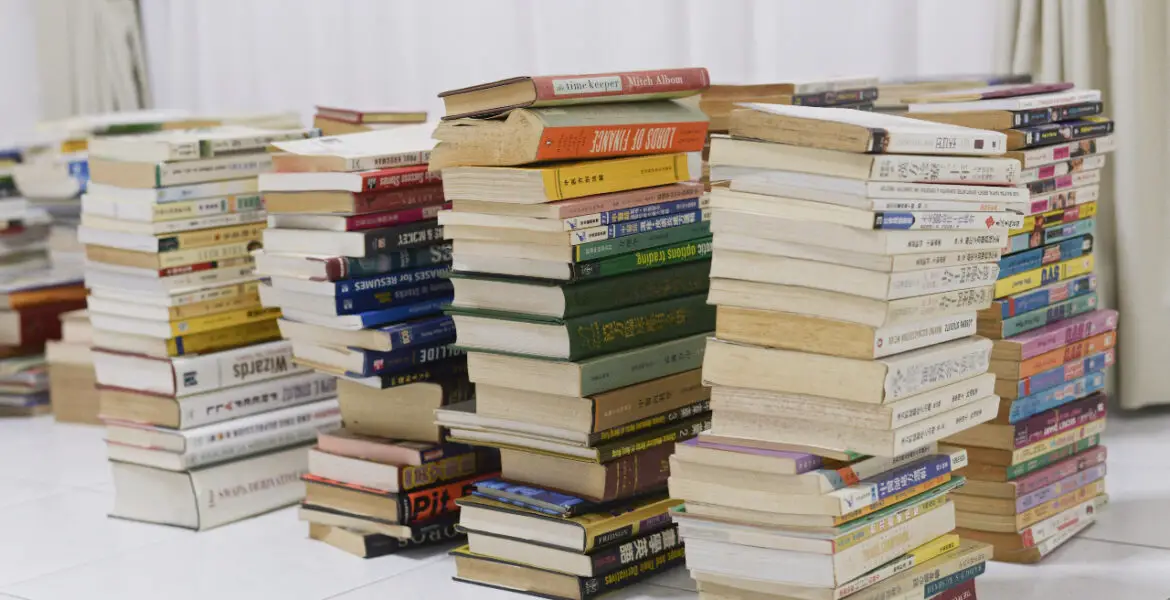Do you feel guilty thinking about decluttering your books? If you answered yes, you’re on the right page! Read on to learn how to declutter books in 4 easy steps.
Hi, book lovers! Do you find it difficult to part with books?
Perhaps you associate books with wisdom and knowledge, and these are things you were taught to cherish since you were young.
Or maybe you just love your books because they mean something to you!
Whatever your reason is, it is valid. I completely understand why you wouldn’t want to get rid of something you have an emotional connection with because I used to have the same problem!
But, are books a huge part of your clutter? If you’re not sure, take a look around your house.
Are your bookshelves filled to the brim? Do you find books in every corner of your home i.e. next to your bed, on the sofa, in the kitchen?
As much as you may love all of your books, let’s face it – you probably haven’t read most of them in a while.
Think about it – books are meant for reading. They aren’t serving their TRUE purpose if they’re just stored on a shelf looking pretty.
Decluttering your books is not an easy journey, but if you’re reading this, I promise you’re already halfway there.
How do I know this? Well, I decluttered my collection this year and I’ve never felt better.
So, if you’re planning to do the same, here’s everything you need to know about how to declutter books.
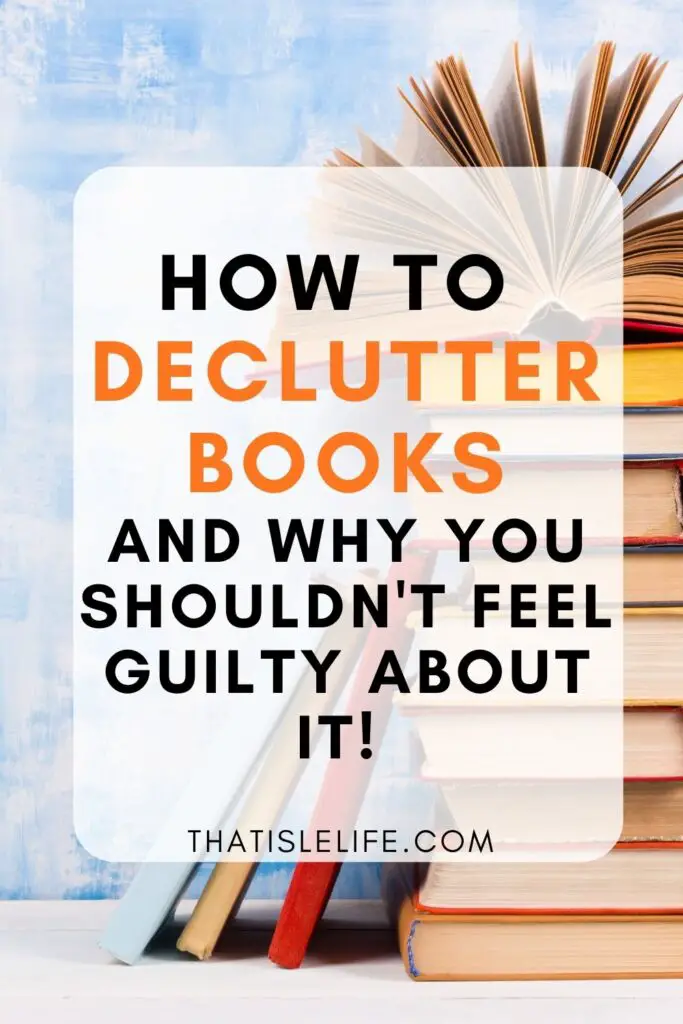
Table of Contents
Related:
- How To Start Decluttering When Overwhelmed
- How To Declutter Shoes For Shoe Lovers
- The Decluttering Mindset – 5 Ways To Change Your Mind About Clutter
- Why Is Decluttering So Hard? 13 Reasons Why & How To Overcome Them
- How To Declutter Your Garage Without Feeling Overwhelmed
- How To Be Ruthless When Decluttering Clothes Once And For All
- 10 Decluttering Tips For Seniors To Make Their Lives Easier
- How To Declutter Paperwork Quickly (& 5 Important Organizing Tips!)
- 15 Decluttering Blogs That Will Motivate You To Start Decluttering Today
- 100 Things To Declutter Today – Get The Ultimate Decluttering Checklist
- 9 Decluttering Motivation Tips That Will Help You To Keep Going
- How To Declutter Quickly – 12 Ways To Declutter In 30 Minutes
How to declutter books
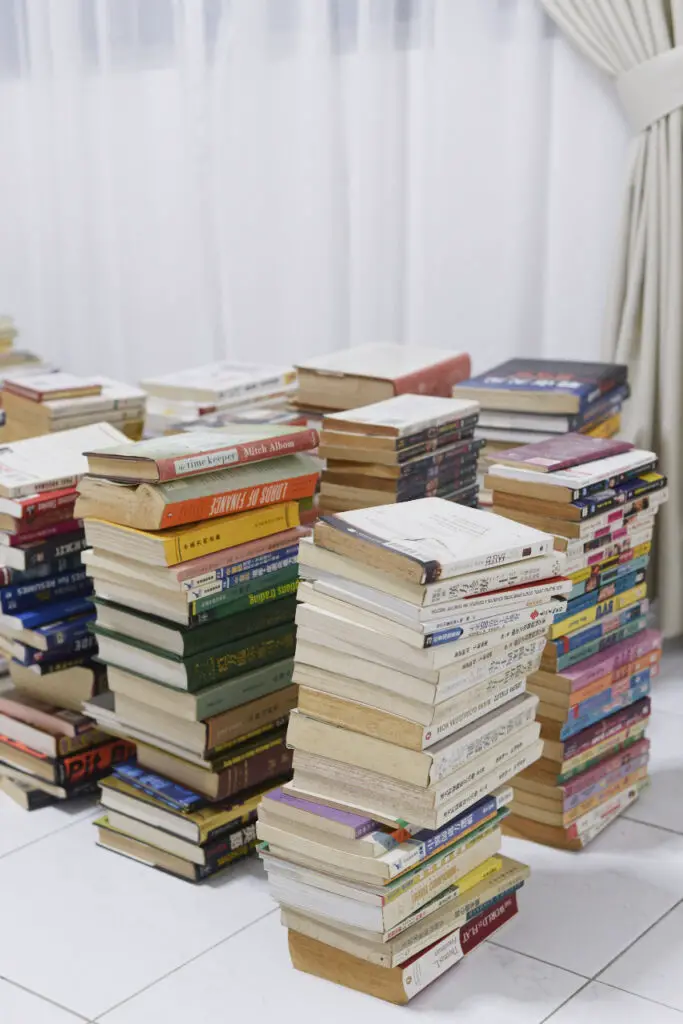
Firstly, you need to have the right mindset. After you’ve decided to declutter your books, you have to accept you’re doing the right thing for yourself.
Once you’re ready, you need to find a spot in your home with lots of space to do the following steps.
1 – Create three categories
Start by creating three separate categories: keep, sell, or donate.
Write these labels on pieces of paper and lay them on the floor or on a table. I prefer the floor because I have so many books!
Be sure not to put the labels too close to each other or you may get confused later.
2 – Take out ALL of your books
Some people prefer to do it in stages to avoid being overwhelmed.
However, I suggest taking out all of your books. This way, you can get a clear view of what you have and what you want to keep.
Once you’ve taken out all your books, it’s time to evaluate each of them.
3 – Evaluate each book
The easiest way to evaluate each book is to use the CREW Method. CREW stands for Continuous Review, Evaluation, and Weeding.
According to the Texas State Library and Archives Commission, librarians have used this method for over 30 years to help them cull outdated materials from their collections.
When it comes to weeding, librarians use the MUSTIE acronym to help them decide.
M – The book is misleading or factually inaccurate
U – The book is ugly. In other words, it is damaged/worn out
S – The book is superseded by a new edition or a better book on the subject
T – The book is trivial
I – The book is irrelevant
E – The book can be found elsewhere
Even if the book only meets one of the six criteria, it is time to let it go. Don’t hold on to a book that provides no value or doesn’t spark joy for you anymore.
Think about paying it forward instead. It feels good to offer it to someone else who will genuinely benefit from the same book!
4 – Allow yourself to keep a few favorites
Some people avoid decluttering their books because they fear they have to get rid of everything!
That’s not true. You are allowed to keep a few favorites.
The Harry Potter series has a lot of sentimental value to me. My mom bought the entire collection for me before it was even popular.
Although I haven’t read them in years, I can’t bring myself to donate them. They will always be a reminder of my mother’s love.
Getting rid of clutter improves mental health. But, you don’t have to feel guilty for allowing yourself to keep a few favorites. After all, what is life if you have no reminders of it?
Which books to declutter
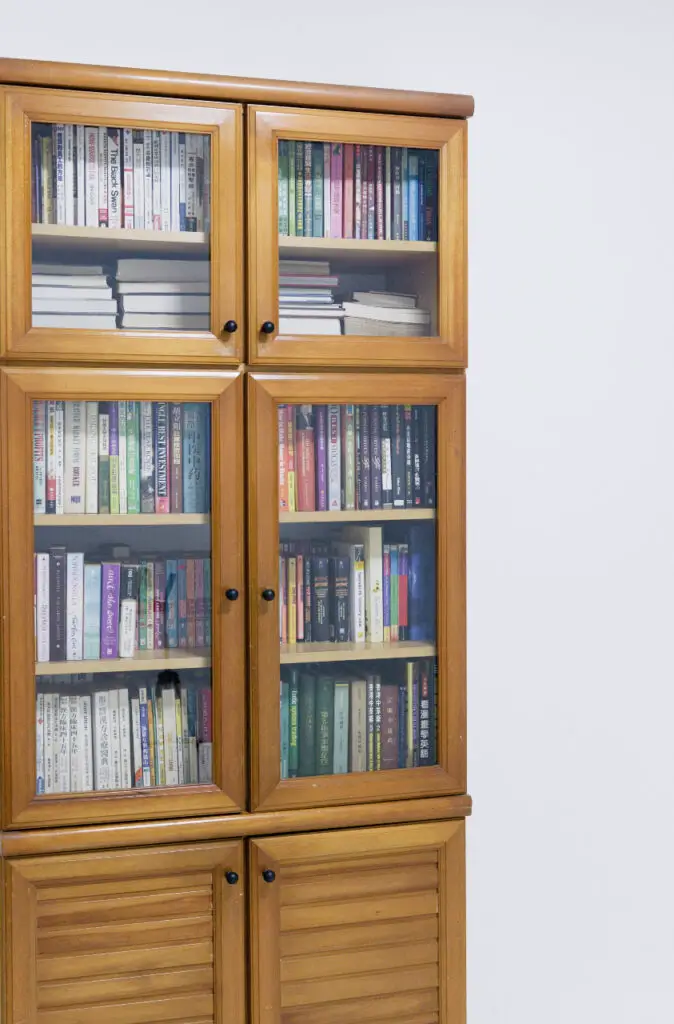
Decluttering your books doesn’t mean you have to get rid of every single book.
Here is a list of books you should consider donating, selling, or discarding. This list is helpful for busy people who want to declutter quickly.
- Children’s books
- Cookbooks
- Magazines
- Textbooks
- Reference books with outdated information
- Duplicate books
- Books you don’t read anymore
What to do with books you no longer need or want
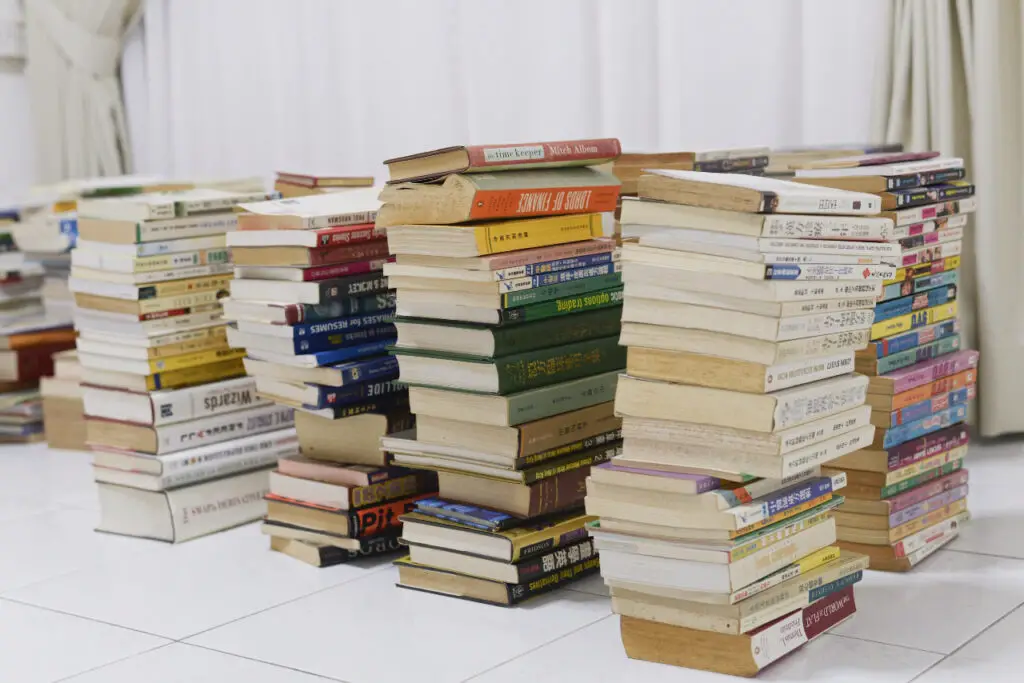
One man’s trash is another man’s treasure. Here are a few things you can do with books you no longer need or want.
Sell
Here are a few avenues where you can sell your books:
- Facebook Marketplace
- Local bookstores
- Thrift stores
- Amazon
- eBay
- Neighborhood yard sale
Donate
Selling books require time and effort. If you don’t need the money, consider donating your books instead. Here are a few avenues to donate your books:
- Church
- Friends or relatives
- Children’s homes
- Hospitals
- Dental offices
- Local libraries
- Shelters
- Charities
Create a free library
If there are a lot of children in your neighborhood, consider creating a free library. All you have to do is to build a makeshift bookcase and fill it with books. Think of it as a fun mystery box full of books!
I wish I had this growing up. If your neighborhood doesn’t have one, you should share the love of reading with your community.
How to avoid book clutter
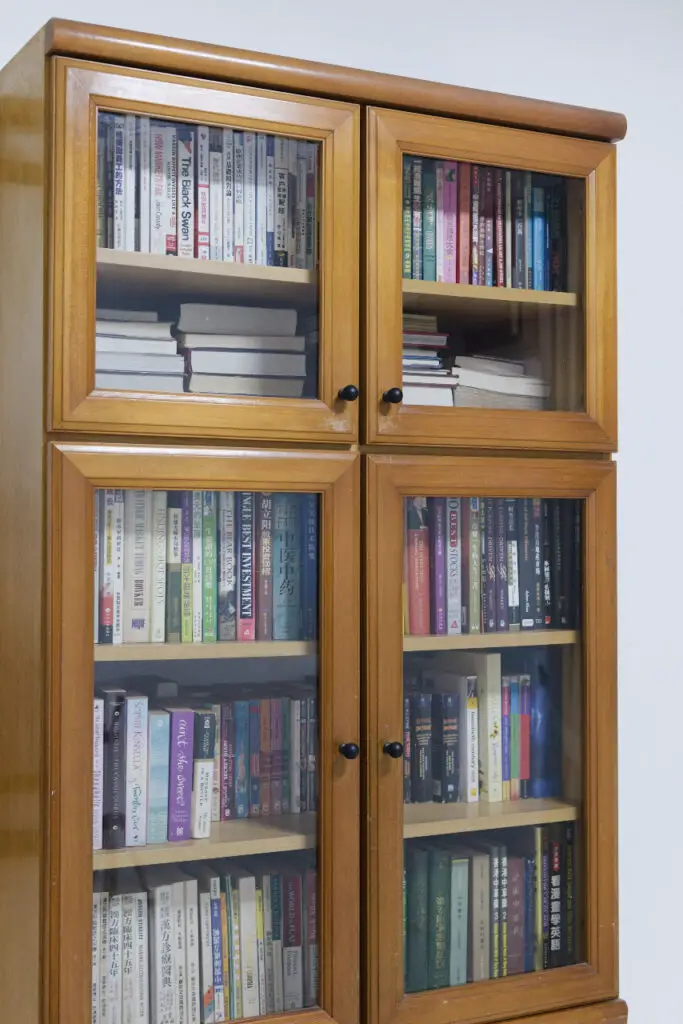
Now that you’ve downsized your collection, here are a few ways you can avoid book clutter in the future.
Visit the library
Interested in reading a new book but not sure if you’ll like it? Well, it’s time to pay a visit to your local library.
Being a member of your local library means you can rent and return all of the books you want. It’s also a lot cheaper to rent books from the library than to buy new ones. All in all, it’s good for the environment and your finances!
Go digital
If you’re an avid reader, consider going digital by reading e-books or listening to audiobooks.
Someone gave me a Kindle almost ten years ago, and it’s one of the best gifts I’ve ever received. It’s lightweight and holds up to 6,000 books. Talk about carrying a portable bookcase with you!
If a Kindle is out of your budget, try subscribing to a digital library like Scribd. It costs $8.99 a month, and you can read as many books as you want. I subscribed last year and it was a real treat!
Alternatively, you can also listen to audiobooks by subscribing to Audible. It costs $14.95 a month, and you can also listen to as many books as you want.
Use Pinterest
If you love to cook, you probably have a lot of cookbooks at home. While some cookbooks can double up as coffee table books, most of them are bulky and heavy.
Try searching for recipes on Pinterest instead! You can pin your favorite recipes and come back to them after when you’re ready to cook. Additionally, you can also save them on your phone.
Organize a book swap
If you enjoy reading, consider hosting a book swap with family, friends, or colleagues. This way, you get to read more without adding the physical copy to your collection.
Scan and save
If you’re a fan of poetry, chances are you probably have a collection of favorite poems. You can keep these by scanning and saving them on your computer.
Remember to keep them for your eyes only as it is illegal to distribute them without consent.
Why you should declutter books
A lot of you may feel guilty for decluttering your books. I felt the same!
However, it’s not always a bad thing to edit your book collection.
Firstly, books are meant to be read and not kept on a bookshelf to collect dust. If you’re not reading them, think of other people who will enjoy them!
Holding on to a book just because you want to is not a strong reason to justify keeping it.
Secondly, books take up a lot of space. They also make up a big part of clutter, which leads to anxiety and stress.
According to the New York Times, clutter affects our mental well-being. We already have so much to deal with on a daily basis. We certainly don’t need another stress factor!
If your home is filled with books, it’s time to lose the guilt and focus on the benefits of decluttering instead.
Frequently Asked Questions
How do I decide which books to keep?
If you’re a bookworm, chances are you have a HUGE book collection (and you probably have a lot of favorites!)
When in doubt, ask yourself – which books are you most likely to read again and again? Be honest!
Besides my Harry Potter series, I hold on to my personal development/motivation books because I need to feel inspired regularly.
How many books should I keep?
Ultimately, it depends on your space and lifestyle.
If you have a small space and are trying to live minimally, 25-30 books should be sufficient.
This number should give you enough variety without cluttering your home.
What questions should I ask myself when decluttering books?
Here are some important questions that will serve as a guide when you’re decluttering your books:
- Have you read this book?
- When was the last time you read this book?
- Will you read this book again?
- Is this book important to me in terms of sentimental value?
- Is this book in good condition?
Answered no to most of these questions? It’s time to let the book go.
Conclusion
As a book lover, I know how difficult it is to part with a collection you’ve taken years to build.
At the end of the day, your book collection should bring you joy. It should not overwhelm you or cause unnecessary stress.
I hope this post gives you the confidence you need to declutter your books. Good luck!
Found this post helpful? Learn more about decluttering here:
- How To Start Decluttering When Overwhelmed
- How To Declutter Shoes For Shoe Lovers
- The Decluttering Mindset – 5 Ways To Change Your Mind About Clutter
- Why Is Decluttering So Hard? 13 Reasons Why & How To Overcome Them
- How To Declutter Your Garage Without Feeling Overwhelmed
- How To Be Ruthless When Decluttering Clothes Once And For All
- 10 Decluttering Tips For Seniors To Make Their Lives Easier
- How To Declutter Paperwork Quickly (& 5 Important Organizing Tips!)
- 15 Decluttering Blogs That Will Motivate You To Start Decluttering Today
- 100 Things To Declutter Today – Get The Ultimate Decluttering Checklist
- 9 Decluttering Motivation Tips That Will Help You To Keep Going
- How To Declutter Quickly – 12 Ways To Declutter In 30 Minutes

